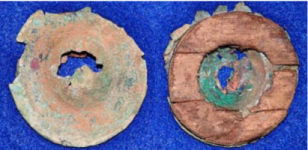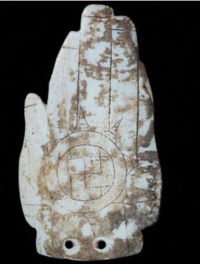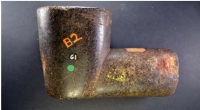|
See these, and more, in this issue of the Central States Archaeological Societies Journal

Click to enlarge |
A beautiful Adena point found by Jeff Wilkes near Savannah
in Hardin County, Tennessee. It measures 5 ½ inches in length.
See this and other great relics in the CSASI 2018
October Journal |

Click to enlarge |
Two earspools above were found in April 2000 in associatrion
with a miniature red painted bowl in Nashville, Tennessee, during the
digging of a utility trench along Browns Creek off of Granny White Pike.
Although in damaged condition, they show how the copper
was attached to cedar in order to make a complete earspool. The copper
would ave originally been brilliant and bright, but has deterio
rated during more than 800 years in the ground, and it is remarkable
these survived at all. Each measures 1 ½ inches in diameter.
Collection of Steve Dedmon, Watertown, Tennessee See this and other great
relics in the CSASI 2018
October Journal
|

Click to enlarge |
Close-upLong Island, Jackson County Alabama/Marion
County, Tennessee (Dr. Sandy Carter collection) hand gorget.
Photograph by Steven R. Cooper
See 'The Yeaman Shell Gorgets from Smith County, Tennessee and a Discussion
of “Hand Gorgets” by by Byron McDonald, Mount Juliet, Tennessee,
and Kevin E. Smith, Middle Tennessee State University in the CSASI 2018
October Journal
|

Click to enlarge |
This Dovetail point was found in 1986 by Angela Austin
and Donnie Armstrong in association with Benton points in Cheatham
County, Tennessee. It has Benton style chipping and grinding in the
basal area. It was found in a shell mound that sat near the bridge
that crosses the Cumberland River. It measures 5 inches in length and
is made from a deep brown Dover chert.
Collection of Leroy Irons, Gallatin, Tennessee
See this and other great relics in the CSASI 2018
October Journal |

Click to enlarge |
This square elbow pipe is 6 inches long by 3 ¾ inches high. It
is made of brown steatite and is probablyearly to mid-Mississippian (900
to 1100 AD).
It was recovered on Jolly’s
Island, Meigs County, Tennessee (hencethe name Jolly’s Island Pipe) by
George Barnes and a Lt. Benham in 1911.
Benham’s parents owned the island atthe time. The pipe is typical of
the Hiwassee Island and Dallas cultures which existed in the region during
that timeframe.
See 'Several Types of Prehistoric Tennessee Pipes' by by Steve Hart,
in the CSASI 2018
October Journal |
|
|




